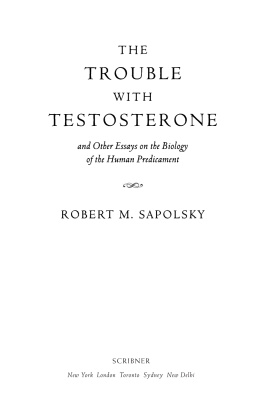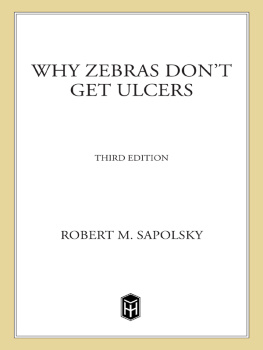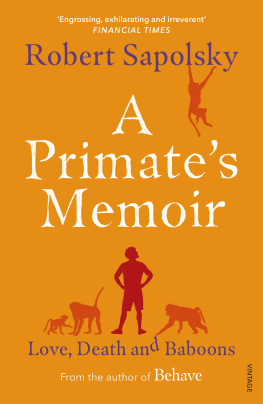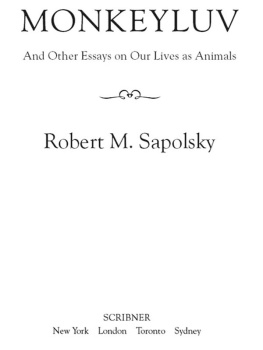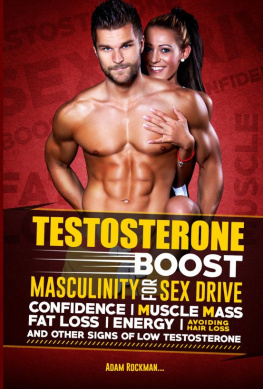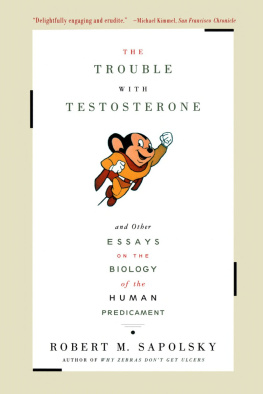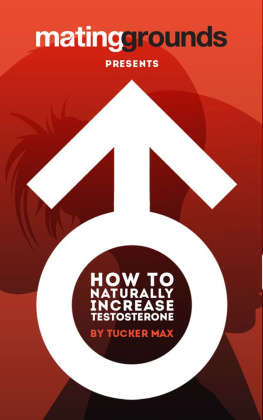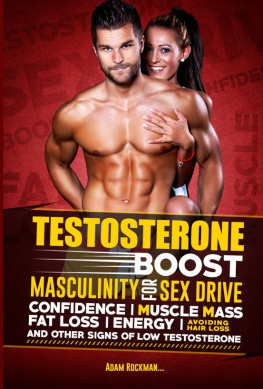
Thank you for purchasing this Scribner eBook.
Join our mailing list and get updates on new releases, deals, bonus content and other great books from Scribner and Simon & Schuster.
C LICK H ERE T O S IGN U P
or visit us online to sign up at
eBookNews.SimonandSchuster.com
Contents

For my mother, who,
a long time ago,
read to me
Introduction

We all have encountered Reinhold Niebuhrs serenity prayer at some point:
God, grant me the serenity to accept the things I cannot change, courage to change the things I can, and wisdom to know the difference.
Behavioral biology is often the scientific pursuit of that prayer. Which of our less commendable ways of behaving, asks the behavioral biologist, can we hope to change (and how) and which are we stuck with? Asked in a harsher wayas our society so often poses these questions of nature and nurturefor which of our failings should we be held responsible? Did Charles Whitman open fire from the University of Texas observation tower and kill eighteen people because of his brain tumor? Did Richard Speck murder eight nurses because of his alleged extra Y chromosome? Did Dan White kill San Francisco mayor George Moscone and city supervisor Harvey Milk because of his diminished capacity: attributable, in part, his lawyers claimed, to a junk food addiction? Did John Hinckley shoot President Reagan because of insanity? Or were they all just rotten characters? What about the spouse sunk in depression? Is a neurochemical imbalance to blame, or is the person just indulging in a profound sulk? Is the floundering schoolchild limited by a learning disability, or plain lazy?
In the most narrow sense, behavioral biologists seek to answer questions such as these by exploring the interface between our minds and our bodies. How is it that you can think a thought, have a memory or a surge of emotionproducts of our mindsand, as a result, alter the activities of virtually every cell in the body? And, in turn, what are the mechanisms by which events in our bodieschanges in hormonal status, nutrition, healthcan change our thoughts and feelings? Answering questions such as these begins to answer the broadest questions of allwhat is the biology of what makes us who we are, what is the biology of our individuality, our limits and potentials?
This is frightening ground to tread, partly because of the complexity of the questions asked. Its easier to determine how birds navigate while migrating or how muscle fibers contract than to answer a question like Is there a genetic basis to criminality? Scarier still are the abuses to which this work is subject. Its difficult to become an ideologue about bird migration or muscle physiology, but behavioral biology is a magnet for those with an ax to grind. Conscientious scientists fear that a minute observation, tenuously offered, might be seized upon by someone eager to lend scientific authority to claims like Im not responsible for my problems, or worse, I dont have to help you in combating your problems, because they are incurable. At one extreme can be a wasted life, when prejudice dictates that there is a limit that does not exist. Witness those who have been discriminated against by race, ethnicity, or gender because they were believed to be biologicallyand therefore, in this view, irredeemablyinferior. At the other extreme, the specter of blame can haunt the blameless, when ignorance leads to failure to recognize a real biological constraint that exists. In that case, witness the generations of dyslexics wrongfully condemned as stupid.
No matter how obscure the subfield of science, there is bound to be some crazed egghead out there who finds it fascinating. When it comes to the biology of our individuality, issues are raised that should be fascinating to each of us for the simple reason that we are all asked to function as behavioral biologists on some occasion. Most importantly, those occasions matter: We serve on juries and decide the culpability of someone regarding something awful that they have done. We are asked to vote on referendums about expenditures of public funds to try to fix some social ill, and we have to decide if we think it can be fixed. We see someone stymied in their learning, claiming to be at their limits, and we must decide whether pushing them harder represents inspiration or cruelty. And perhaps we will have to watch a loved one decline with some terrible disease, watch their personality be transformed, and have to learn that this is due to the illness and not to them.
Insofar as we are forced to be practicing behavioral biologists, we might as well be competent at it. This collection of essays is meant to help a bit in that direction in that it offers a tour of the field (albeit a highly unsystematic one, which is to say that it covers a hodgepodge of topics that Im particularly fascinated by). Broadly, the essays fall into three categories. One group presents some of the latest breakthroughs in psychiatry, neuroscience, and endocrinology. One might assume that much of these findings will be about big, messy problems in abnormal human behavior, about mental illness, uncontrollable violencethe arena of them and their diseases. As will be seen, some of the most provocative findings in the field are a lot closer to home, are about far more subtle issueswhy we differ in our sexual orientation, in our desire for novelty, in styles of thinking and feeling; this is not about them and their diseases, but about the biology of the quirks and idiosyncrasies of our everyday behaviors. It is my experience from lecturing about these topics that people get fairly disturbed by the implications of some of these findings, as we wind up seeming to have a lot less volition in our behaviors than most like. The extreme example of this is Circling the Blanket for God, the final essay in the collection, in which I consider some of the neuropsychiatric roots of religious belief.
Another set of essays explores many of these same issues from the perspective of evolutionary biology and animal behavior. Initially, many of these pieces will seem to be about how some of our close relativesnonhuman primates, for exampleturn out to be vastly more subtle and complex in their behaviors and emotions than one would ever have guessed from watching Wild Kingdom. What often only sinks in next is not only how subtle and complex they are but how familiar, reinforcing the lesson that we humans are just another primate species: a terribly neurotic, screwed-up, overly self-conscious one with some fancy thumbs, but still just another primate. As but one example of this style, Primate Peekaboo, written a year ago when, to my embarrassment, I was devoting about ten hours a day to thinking about the O.J. trial, considers the intense voyeurism that is common to all of us primates.
Finally, another group of essays considers some of the political or social implications of findings in these areas. Some of these are historical, reviewing some of the disastrous deadends in behavioral biology, some of which are the end-product of well-intentioned mistakes, some the end-product of anything but good intentions. For example, in Povertys Remains, I recall the history of an imaginary disease that was invented around the turn of the century because scientists did not yet know anything about how stress affects the body, and before it was over with, thousands of people were killed by the consequences of medical belief in this erroneous discovery. And some of these pieces are meant to alert us to some of the dangers to come. In How Big Is Yours? for example, I discuss some recent and controversial evidence that the size of a certain sliver of the brain has something to do with a mans sexual orientation and then raise the questionwhat happens when brain imaging techniques get to the point, as they soon will, where a ten-year-old can be informed as to the size of that silver in his own brain?
Next page
